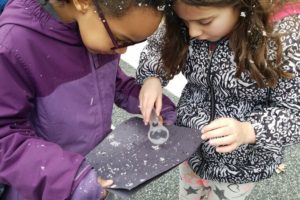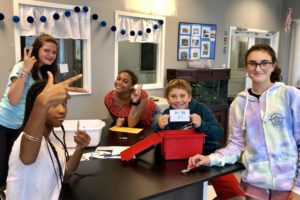The Whole Child
 Written by Montessori Educator, Maryann Younger
Written by Montessori Educator, Maryann Younger
We hear a lot of talk these days about the whole child, and that schools should be focusing on the needs of the entire child and not just test scores and classroom achievement as the only measures of success. A child can’t come to school hungry or scared and be expected to learn. They should be engaged and challenged and supported by the adults in their lives. All of this is great news for our children, because there are many expert voices advocating this approach.
The part that amazes me, though, is that in some corners, this is viewed as breaking news, a shiny new revolutionary approach to education.
Montessori education has been about the whole child since 1907.
Wholeness in a Montessori classroom means that the whole child is engaged: movement is encouraged and exploration through all of the senses is recognized as essential to learning; emotions are recognized and heard; the child is seen as whole and not broken.
It starts with an engagement of all of the senses. Babies do this naturally. Remember when your young one put everything in his or her mouth? When those small hands reached to touch everything in their path? All of those experiences were learning moments. When you added language to describe what your child was doing, feeling, tasting or smelling, it all came together in an understanding of the world.
The Montessori classroom does the same thing. Through specifically designed materials and by utilizing all of the child’s innate internal resources, they learn. The whole child is engaged in their education.
Wholeness is about how we feel, too. One of the most essential aspects of a Montessori education is the right and expectation of kindness, dignity and respect. Each child is treated as the intelligent human being that they are, and each child is expected to treat others the same way. When adults show respect to children, it means they listen to them and value their emotions and experiences. It means they never talk down to them or demean or embarrass in any way.
This attentiveness towards the needs or feelings of the child doesn’t mean that kids get to do whatever they want or run around willy-nilly because they feel like it. It means that there are conduct guidelines for how we treat each other and our materials. The great part is that we don’t preach those rules from the front of the room by stating and enforcing classroom lists; each child learns by experiencing respect from others. It is so much easier to respect others when valued and appreciated first.
Montessori looks at the child as whole, not broken. Each individual is seen as creative, resourceful and whole. I marvel at the advances in diagnostic tools to evaluate, identify and fix what is wrong with our kids. However, I think everyone carrying around those deficiency labels like identity badges has gone too far. Let’s shift our focus on what’s right. The Montessori classroom accepts the child as a unique individual who has the full capacity to learn, and provides experiences and skills to develop his full potential. Regardless of any label or diagnosis, the child is regarded and treated as complete and competent.
Montessori education recognizes, engages and supports the inherent goodness and wholeness of each child. Come see for yourself what it can do for your child.
About the Author: Maryann Younger first entered a Montessori classroom when she was 2 years old. In addition to exploring the classroom and learning to read with her own small hands, she taught children, mentored teachers, championed the approach, parented her own Montessori children to adulthood, and counseled countless other parents. The teaching of Dr. Montessori has been a faithful guide through her life’s work in schools, education and non-profit leadership.



